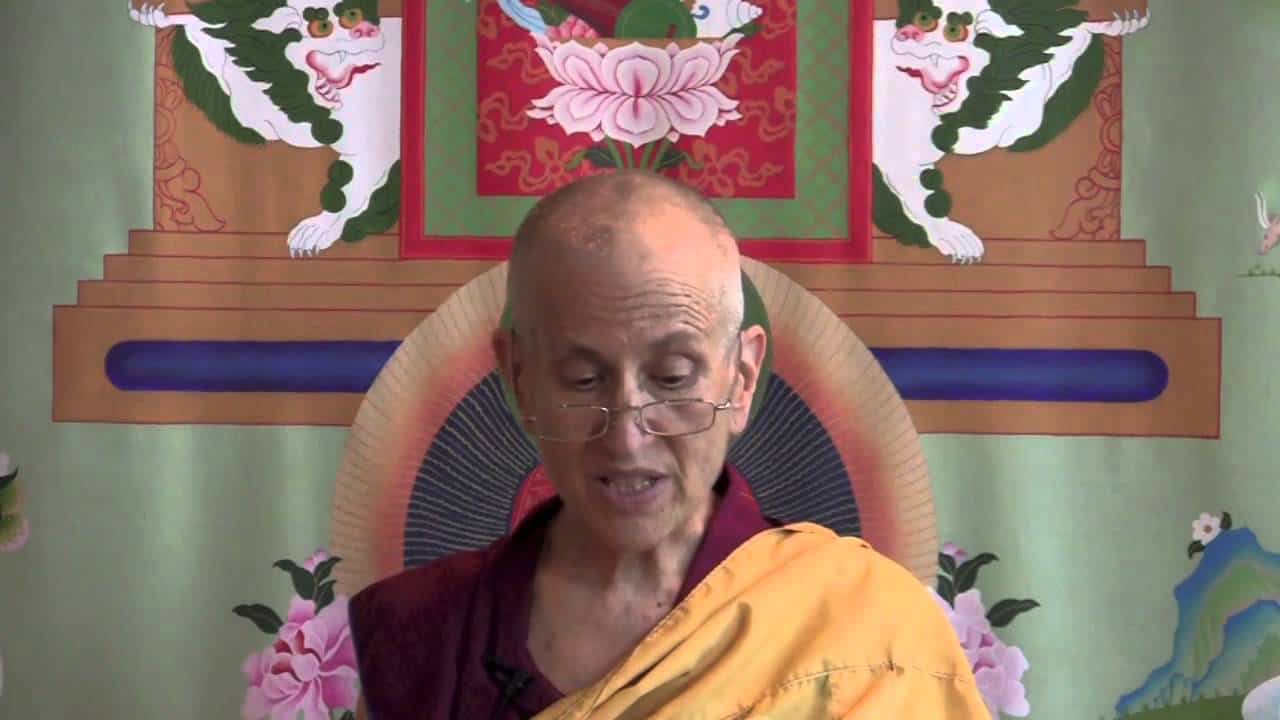Verse 87: Protecting the Dharma jewel
Part of a series of talks on Gems of Wisdom, a poem by the Seventh Dalai Lama.
- Three kinds of wisdom: hearing, thinking, meditating
- The importance of thinking about the teachings, not just hearing them
- Reflection and meditation help integrate the teachings in our minds
Gems of Wisdom: Verse 87 (download)
In the previous verse we talked about the “sublime oral instructions that reveal the inner meaning of the Dharma.” And the oral instructions that are passed down from teacher to student, and kind of updated in terms of how they’re expressed. It’s the same teachings, but how they’re expressed is kind of updated as the centuries go on.
The next verse is…. Well, you’ll see. The next verse follows from that. So, Verse 87 says,
What is the supreme jewel to be most carefully guarded?
The essence of what has been heard that, when relied upon, brings transformation.
“The essence of what has been heard.” When we talk about the three kinds of wisdom, or the three steps in practicing, we talk about:
-
hearing the teachings, which includes learning them, reading them, studying them, hearing them, any kind of learning study;
-
contemplation, which means reflecting or thinking about the teachings; and
-
meditation, when we try and integrate the teachings.
A lot of what we call meditation is actually “thinking” and “reflection,” because we’re trying to get a right conceptual understanding of the teachings, which you really need in order to integrate them in your mind. So thinking and reflection can be done seated in meditation posture. It can also be done by discussing the Dharma with other people, and by really checking your understanding. That’s one of the purposes of debate, actually, so that you develop a correct understanding of the teachings. Because just hearing the teachings themselves, you may or may not correctly understand it. If you meditate on an incorrect understanding you’re not going to get where you want to go. So you do the thinking, discussing, debating kind of part to make sure you have a correct understanding.
Then you go to the meditation where you’re really trying to delve deeply and to integrate the teachings in your mind through concentration.
Here it’s talking about the hearing which when relied upon brings transformation. The hearing of teachings isn’t sufficient. It’s a first very, very important step, but we have to rely upon those teachings, just as the person who’s sick has to take the medicine, not just get the prescription and fill it. You have to take it. So you have to rely on the teachings. And then doing that is what brings transformation into your mind.
He’s calling that “the supreme jewel which is to be most carefully guarded.” I was thinking, when you’ve heard a lot of teachings—this is also part of the reason that in the Tibetan monasteries they memorize a lot of the teachings—is because that helps you remember everything so that even if you don’t have your notes, you don’t have a text, you can remember what the teachings are. And that becomes a very precious jewel because it means that whatever situation you’re in you can remember the teachings. If you don’t remember the content, or you don’t remember the verses themselves, then when you’re not near a computer or near your notes you don’t know what to practice. So it’s important to have this memory of the teachings.
I was thinking, what happened in the Cultural Revolution in China where so many people (both in China proper and in Tibet) the monastics were thrown in prison, their scriptures were burned, their monasteries were destroyed, but they still had the jewel of the Dharma, they had the teachings in their minds—those who had heard a lot of teachings, and especially those who had memorized teachings. They had this in their minds so even they were confined in prison they could still do their recitations in their minds, they could still meditate. They didn’t have to externally show that they were doing any kind of practice.
So it is, too, from one day to the next we could wind up in an ambulance and in the emergency room in the hospital, and we don’t have all…. You don’t have your little empire with you. You know, in the meditation hall and your table with your picture and your mala and your this and your that. She has her iPad, and others of you are old fashioned and have your notebooks. So you don’t have all of that. You’re right there in the emergency room or in ICU and you have to do what you can with what’s in your mind. So hearing what we have is very very important.
And then of course the familiarization with what we’ve heard through thinking about it and meditating on it is also very important so that we can recall these kinds of things when we really need them.
They say that that’s more precious than a wish-fulfilling jewel. A wish-fulfilling jewel is this mythological jewel to be found somewhere in the ocean that when you have it it will grant all of your wishes. But it grants only your wishes of this life. A wish-granting jewel can—in our mind—be the thing that makes everybody do what we want them to do. So you can, in your meditations, finally you found the thing that can make everything be exactly the way you want it to be when you want it to be that way. But hearing even one teaching is more valuable than all of that because all of that pertains just to this life’s happiness which disappears very quickly. And this life’s happiness doesn’t bring us benefits in the future life, it’s over in this life and it’s like last night’s dream. And when you die you even stop remembering last night’s dream. The whole thing’s completely gone.
So it’s much better to have the teachings in your mind and the teachings imprinted in your mind through familiarization, because that’s something that you can call on at any time and that can come with you. And that really helps, because the teachings—when we use them to transform our minds—will enable us to have a good rebirth, and (hopefully) a series of good rebirths that we can then use to practice the Dharma, realize emptiness, generate bodhicitta, and attain full awakening. So, teachings more valuable than all of that.
There you can really see the power of attachment because when “chocolate cake” comes in the mind, forget the teachings. (Whatever “chocolate cake” is to us at that moment—it could be your boyfriend, your girlfriend, your parents, your pet dog or cat or your promotion, or your salary, or your possessions, it doesn’t matter, we all have our own version of “chocolate.”) But whenever chocolate comes in the mind, forget the Dharma. It’s like, this thing is, yes, really the source of my happiness. But if we’re able to step back and think on a more long-term basis what is it that will really benefit us, then it’s the teachings.
Venerable Thubten Chodron
Venerable Chodron emphasizes the practical application of Buddha’s teachings in our daily lives and is especially skilled at explaining them in ways easily understood and practiced by Westerners. She is well known for her warm, humorous, and lucid teachings. She was ordained as a Buddhist nun in 1977 by Kyabje Ling Rinpoche in Dharamsala, India, and in 1986 she received bhikshuni (full) ordination in Taiwan. Read her full bio.


